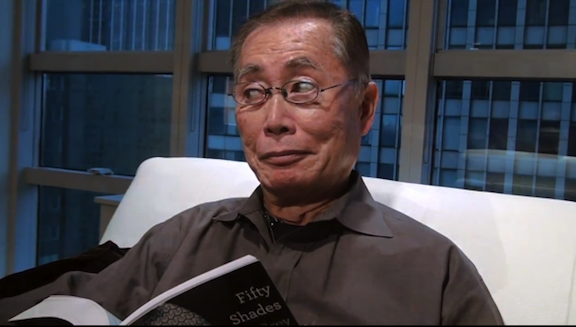Jennifer M. Kroot directed the documentary feature It Came From Kuchar, about the legendary underground filmmaking twins George and Mike Kuchar, which premiered at the 2009 South by Southwest Film Festival and won Best Documentary at the Chicago Underground Film Festival and the Boston Underground Film Festival. Kroot also wrote, directed and starred in the gender-bending, sci-fi narrative feature Sirens of the 23rd Century (Frameline 2003). (Press materials)
To Be Takei will play at the Human Rights Watch Film Festival on June 15.
W&H: Please give us your description of the film playing.
JMK: To Be Takei is a documentary portrait of the actor and activist George Takei. He is best known for his role as Sulu on the original Star Trek. This film covers his experiences being imprisoned in Japanese American internment camps during his youth, his acting career, and his choice to “come out” later in life and advocate for LGBT civil rights. It’s also a romantic comedy! The present-day thread of this film follows George’s relationship with his husband (and manager) Brad. Anyone who’s been in a long-term relationship (straight or gay) will recognize the functional/dysfunctional dynamics.
W&H: What drew you to this story?
JMK: I am a life-long fan of the original Star Trek. I thought it was wonderful when George Takei decided to publicly come out at age 68 in 2005 and become an LGBT civil rights activist. I found his use of popular culture and outrageous comedy mixed with seriousness to be compelling. I then found out that George had been imprisoned with his family in Japanese American internment camps during his childhood. I couldn’t believe the tremendous obstacles that George had faced and was even more impressed with the grace he uses to speak about it. I became obsessed and had to make the film.
W&H: What was the biggest challenge in making the film?
JMK: Funding was a challenge. We did get funding from five different foundations/grants and many individual donors. I heard feedback from some of the foundations that declined to give funds that, since this film is about a Star Trek star, we should just go to science-fiction conventions and ask fans for money. Of course that’s ridiculous. I think that some foundations that support documentaries have a problem with supporting pop culture-themed docs because they think it’s fluff, but George’s story is an endless struggle for civil rights and we can bring this story to a broad audience because of his enormous popularity.
W&H: What advice do you have for other female directors?
JMK: Act confident (even if you’re not!). Don’t “try to be male.” Don’t apologize for being female. Be yourself, and even if you feel like youre different than your predominantly male peers, just own it. Sometimes being different will help you stand out. People may underestimate you, but that’s fine. It’s more fun to be underestimated, because then you surprise everyone when you make a great film.
W&H: What’s the biggest misconception about you and your work?
JMK: I think that some people will expect a vanity piece, since the film is about an actor, and such a beloved actor! This film covers many aspects of George Takei head on. There are points in the film that make George uncomfortable, like the discussion of his choice to take roles that were Asian stereotypes early in his career, and also his reluctance to publicly “come out” until he was 68. George was not involved in any editorial choices in making this film.
George and his husband Brad are very supportive of the film and have attended several screenings, because they like the fact that we captured the real story. The film is an honest look at George’s life and the complex issues and obstacles he’s faced. We are thrilled that the Human Rights Watch Film Festival appreciates this unique tale of civil rights told through a pop-culture phenomenon.
W&H: Do you have any thoughts on what are the biggest challenges and/or opportunities for the future with the changing distribution mechanisms for films?
JMK: Distribution is really in a dire state for filmmakers. It’s just the truth. There are so many cheap and instant ways to see films that there’s less and less money for filmmakers. The distributors that actually pay don’t buy very many films, so it’s extremely competitive. If you do get a real distribution deal, it’s a great idea to try to negotiate to keep or share digital download rights.
If you can’t get a distribution deal, there’s a lot of talk about self-distribution, but I know very few filmmakers that have been able to make money that way (and those filmmakers make self-distribution a full-time job). I would suggest at least setting up your own digital-download site where people can buy your film. Never give your film away for free. Always treat it like it’s valuable and exclusive.
W&H: Name your favorite woman directed film and why.
JMK: Jennie Livingston is an amazing director. Her documentary Paris is Burning is my favorite documentary, maybe my favorite film. She had such spectacular access to a group of very disenfranchised people and didn’t judge them, but captured their incredible beauty. It’s a very difficult thing to do! This film is timeless and resonates with audiences of all ages. I teach film at The San Francisco Art Institute, and whenever I show this film, no one looks at the clock.
My other favorite female filmmaker is Julie Taymor. I especially love her film Titus. It’s everything that’s usually not associated with women. It’s wildly campy and insanely violent. I love her theatrical sensibility and art direction. It’s totally over the top.







